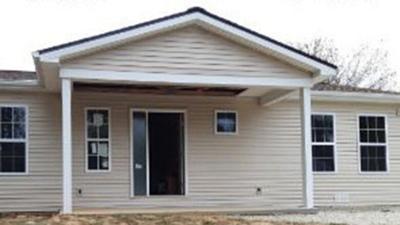A Festus-area woman is suing the Jefferson County chapter of Habitat for Humanity and others over a house south of Festus that she says the nonprofit organization built for her but sold to someone else.
The house is in the 2900 block of Cole Drive on property where the Festus woman, Teresa Armstrong, had lived in a previous house that burned down in 2014, according to her lawsuit filed in the Jefferson County Circuit Court.
In addition to the local Habitat for Humanity, the other defendants in the case are Bank of Bloomsdale and Lana Faye Farrell, who is the current owner of the property, according to Jefferson County Assessor’s Office records.
According to those records, Farrell has owned the Cole Drive home since 2024. Before that, Habitat for Humanity of Jefferson County owned it from 2020-2023; Armstrong alone owned it from 2010-2019; and Teresa and Kenneth Armstrong Jr. owned it from 2006-2009. The online records do not go back further than 2006.
Armstrong could not be reached for comment about her lawsuit.
Attorney David Duree is representing Armstrong in the case, and someone from his office said Duree had no comment about the case.
In the lawsuit, Armstrong is asking for the local Habitat for Humanity chapter to deed the new house and property to her and to compensate her for items she had purchased for that new house. She also asks to be compensated for other damages and attorney fees.
The Leader learned about the lawsuit after the paper ran a March 6 story about Habitat for Humanity of Jefferson County in which the chapter’s chairman, Dean Eshelman, said the organization had been inactive since 2019 and was preparing to start a new house-building project.
After the story was published, several of Armstrong’s friends and acquaintances contacted the Leader and said they had worked on the Habitat for Humanity project to build a house on Cole Drive, which they believed would go to Armstrong. They said the house-building project started in 2021 and stretched into 2023.
“I had participated in the building project,” Mandie Swart of Arnold said. “I gave what time I had. I was there to help my friend, Teresa.”
Tom Cisco of Festus said he, too, had worked on the project.
Both Swart and Cisco said they volunteered their time and labor to the house-building project because they believed the house would be turned over to Armstrong when it was completed, adding that they were angry and disappointed the house was sold to someone else.
After the Leader learned about the Habitat for Humanity house built from 2021-2023, a reporter called back Eshelman to ask about it, and Eshelman did not acknowledge the existence of the house and then did not return subsequent phone calls asking for comment. In addition, Habitat for Humanity of Jefferson County board members David Courtway and Terry Kreitler, as well as the chapter’s president of operations, David Crump, did not respond to voicemails left asking for comment.
Attorney Derrick Good said on March 17 that he is representing the organization in the lawsuit but could not comment on “ongoing litigation.”
Lawsuit details
The lawsuit states that the “plaintiff demands a trial by jury on all counts, issues and claims.”
It further states that “Neither Habitat-MO nor Habitat-Missouri permitted Teresa to reoccupy her home after it was reconstructed.”
The lawsuit declares that Armstrong is the owner of the property, and in 2014, the house on that property burned to the ground, leaving a concrete basement, a detached two-car garage and a shed. Habitat for Humanity later bulldozed the shed.
It further states that in October 2019, Armstrong submitted a pre-application to the Habitat for Humanity for housing assistance, and on Jan. 27, 2020, Armstrong signed a partnership agreement with the organization to have a new house built on the property that she would buy. As part of that agreement Armstrong deeded the property to Habitat for Humanity and was required to perform “sweat equity” on the building project by participating in the reconstruction and providing “friends, family and relatives” to participate in the building project. The agreement states that once the loan for the property was paid off, Habitat would deed the property back to Armstrong.
On Oct. 19, 2023, Habitat for Humanity terminated the partnership agreement with Armstrong. In the termination letter, Habitat for Humanity said the underwriter, named in the lawsuit as Bloomsdale Bank, for the loan needed to build the house alerted the organization that since the time of Armstrong’s initial application, her financial situation had changed and she was no longer eligible for a Habitat house based upon her debt-to-income ratio.
In her lawsuit, Armstrong disputes the claim that her change in financial status precluded her from repaying Habitat for Humanity for the loan to build the house.
The lawsuit says she had three jobs when she filled out the application for Habitat for Humanity housing assistance, but later she lost two of those jobs and then was injured on her remaining job and became disabled. However, the suit asserts she still could have met her financial obligations to pay her debt on the house because she began receiving Social Security disability payments.
She does not “owe any credit card debt, or any other debt, and her financial ability to repay the loan is better now than it was when she signed the partnership agreement,” according to the lawsuit.
Armstrong says in the lawsuit she performed the “sweat equity” required of those receiving Habitat for Humanity houses, and she also provided $5,230.86 in materials used to build the new house.
On Sept. 22, 2022, a Habitat for Humanity member contacted Armstrong by email and said that the construction on the new house would be completed within two months, but the construction was not completed until October 2023, she asserts in the lawsuit.
Included in the lawsuit is a Habitat for Humanity letter to Armstrong dated Nov. 2, 2023, that says, “As we stated to you in our previous letter, we would be happy to offer you the agreed upon value for the property, as well as reimburse you for charges on your personal credit card for the appliances installed in the home.”
Habitat advertised the Cole Drive home for sale for $230,000, Armstrong says in court documents.
In her lawsuit, Armstrong is asking Habitat for Humanity to pay $84,000 in damages for materials she purchased, rent she paid, the value of sweat equity and the loss of the use of her home and land, as well as $50,000 in attorney’s fees; $11,675 for the personal property left in the two-car garage “converted” by Habitat for Humanity, plus any court costs.
She also is asking for Bloomsdale Bank to pay in excess of $230,000, plus court costs, claiming the bank falsely and intentionally advised Habitat that Armstrong’s debt-to-income ratio required Habitat to de-select her as the reconstructed home recipient, causing Habitat to terminate the partnership agreement with Armstrong and attempt to transfer ownership of the property to Farrell, the suit says.
In addition, she seeks in excess of $230,000 from Farrell, along with court costs.
She also asks the court to rule she is the owner of the property on Cole Drive.
Mark Bishop, attorney for Bloomsdale Bank, issued the following statement about the lawsuit:
“The only statement that I will make with regard to this case is that allegations against Bloomsdale Bank have no merit and we expect to prevail with regard to those claims in this litigation.”
Attorneys for Farrell did not respond to requests for comment.




